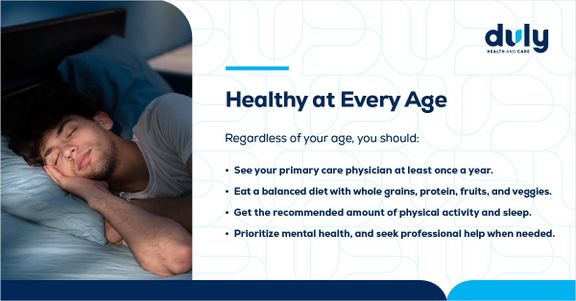When you travel, you might have a packing list. If your child is about to start school, you might have a shopping list. And when you have a million tasks to get done in a day, you might write a to-do list.
Many parts of our life can be broken down into smaller chunks to make tasks easier to accomplish — and don’t you sometimes wish there was something easy like a grocery list, but for your health?
Now there is — and this list can help you stay healthy throughout your life. Check out these healthy aging tips for every decade. Like a grocery list, the items on it may vary from person to person depending on their needs.

If you’re in your 20s …
- Find a primary care provider. You may have been lucky enough to have the same primary care provider throughout college, but now is a good time to find someone you like and can build a new relationship with
- If you are a female, you should get your first pap smear at age 21 to screen for cervical cancer.
- Practice safe behaviors. Don’t start smoking tobacco (and if you do, quit while you’re young). Avoid binge drinking, use protection during sexual activities, and always wear your seatbelt.
- Keep yourself covered — with insurance. At 26, you may experience a change in your health insurance if you have been covered by your parent’s plan. Learn more about your options for applying for health insurance after your 26th birthday.
Make your annual wellness visit a priority at any age by finding a Primary Care Provider or making an appointment with yours today.
If you’re in your 30s …
- Develop habits that will set you up for success and healthy aging, like eating balanced meals and staying active. Now is a great time to find a form of physical activity you love or want to learn!
- If you are considering starting a family, there are several things you can do to prepare before you even start trying to conceive. Talk to your provider about family planning and learn more about prenatal and postpartum care such as taking a folic acid supplement.
- Begin finding specialists who can support you as you age, like a dermatologist. It’s always good to have a relationship with a provider before you need them.
- Listen to your body. You may think that experiencing changes in your health during your 30s is too early and ignore signs your body is trying to tell you something. Talk to your primary care provider about any major changes in your physical or mental health.
If you’re in your 40s …
- You will need to make sure you get a few important routine cancer screenings. For people with an average risk, this means getting your first colonoscopy at age 45, and if are a female, getting your first mammogram at age 40.
- Look out for changes in your eyesight. Many adults over the age of 40 begin to have trouble seeing things far away or reading things nearer to your face (like a book or laptop). Schedule an eye appointment at least every 2 years.
- Destress. From work to kids to everything in between, it’s always a good time to step back and see how much stress is in your life — and what strategies, like mindfulness or yoga, can help you manage it.
- Refresh your memory on your family medical history. It’s good to know about your risk for diseases that may be common in your family, like heart disease and different kinds of cancers so your provider can ensure you get screenings early if needed.
If you’re in your 50s …
- Walk more. Staying active is a key way you can stay healthy as you age, but it can be tough to know what exercises to do. Try different exercises you’ve always wanted to try, like racquetball or Zumba — or simply get out and get more steps in your day.
- Keep your brain active. It’s not just about working out your body, but your mind too. From learning a new skill to doing a daily sudoku puzzle, there are many ways to keep your mind sharp.
- You may want to get screened for lung cancer in your 50s depending on your smoking history. It’s also never too late to quit.
- It’s possible that sometime in your 50s or 60s, you may take on more responsibility caring for an aging parent. This means you may have less time to care for yourself, so be sure to make time for intentional self-care.
If you’re in your 60s and beyond …
- Get your flu shot. It’s important to get your flu shot every year regardless of your age, but your risk of getting a severe case of the flu goes up as you get older.
- As you get older, it’s important to maintain friendships and relationships as a key part of healthy aging. You can also look for new ways to connect, such as by volunteering, taking a class at a local college, or checking out your library for fun programming.
- Prevent falls in your home. A simple fall can lead to a serious injury, but small steps like using a cane or walker, installing grab bars in your shower, and getting rid of tripping hazards can keep you safe and healthy.
- Take the time to think about advance care planning. While it may not be the most fun topic to think about, having written documents outlining your health care proxy and future care wishes can make you feel confident that you will receive the care you want.
Staying Healthy at Any Age
Many of the tips for each decade could apply in other decades as well — and there are many recommendations that should be in each category, like seeing your primary care provider once a year, getting enough sleep, and reducing stress in your life.
No matter your age, it’s not too late to develop new healthy habits that can support you throughout your entire life. Whether you want to talk about starting a family or tips for fall prevention, your Duly Health and Care provider will support you in each and every decade.
Health Topics:








